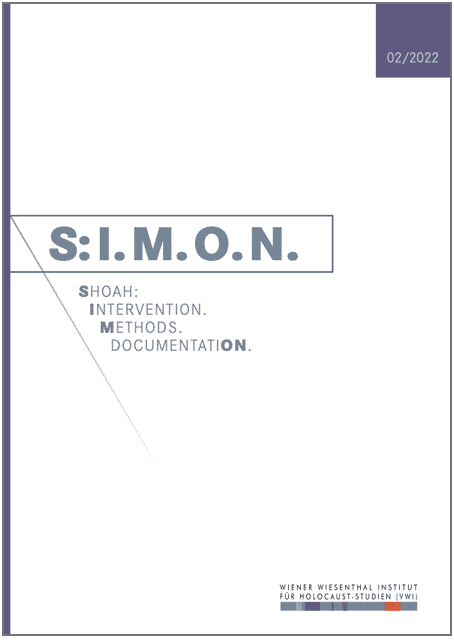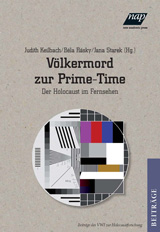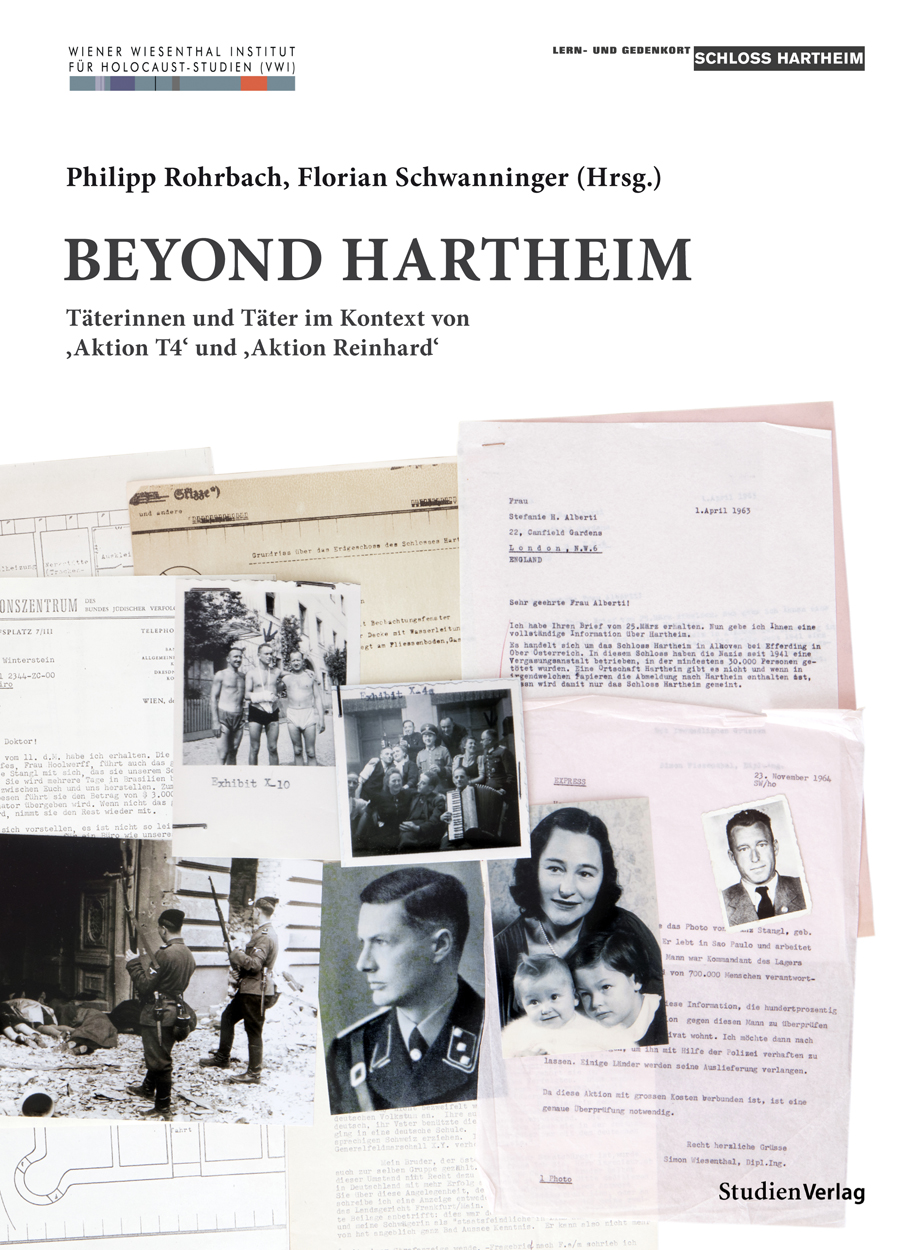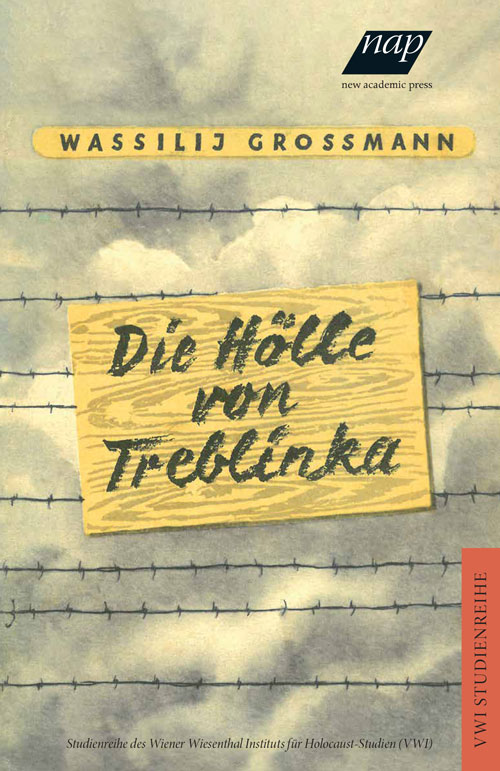News – Events – Calls
| 02. May 2024 18:30 Simon Wiesenthal LectureEdyta Gawron: Never Too Late to Remember, Never Too Late for Justice! Holocaust Research and Commemoration in Contemporary PolandIn 1994, Simon Wiesenthal received a doctorate honoris causa from the Jagiellonian University in Krakow for his lifelong quest for justice – half a century after he had been, for a short time, prisoner of the local Nazi Concentration Camp (KL) Plaszow. The 1990s were the decade when t...Weiterlesen... |
| 07. May 2024 00:00 - 04. June 2024 00:00 WorkshopDealing with Antisemitism in the Past and Present. Scientific Organisations and the State of Research in AustriaThis series of talks, presented by antisemitism experts from different organisations that research antisemitism using a variety of academic approaches, aims to provide a snapshot of historical evolutions, current events, prevalent perceptions and declared (and undeclared) attitudes. I...Weiterlesen... |
| 14. May 2024 08:45 - 16. May 2024 16:30 TagungQuantifying the Holocaust. Classifying, Counting, Modeling: What Contribution to Holocaust History? About the conference: https://quantiholocaust.sciencesconf.org/ Programme timed on the basis of 15-minute presentations + 15-minute discussions; short breaks and lunches Day 1 Tuesday, 14 May 2024Centre Malher (9 rue Malher 75004 Paris/amphi Dupuis) From 8.45 am: Welcome9.30 am...Weiterlesen... |
| 24. May 2024 18:00 InterventionLange Nacht der Forschung 20242024 öffnet das Wiener Wiesenthal Institut für Holocaust-Studien (VWI) in der Langen Nacht der Forschung wieder seine Tore und lädt Interessierte in seine Räumlichkeiten am Rabensteig 3 ein. Im Rahmen von Vorträgen, Podiumsdiskussionen und Präsentationen bieten VWI-Team und Gäste Einb...Weiterlesen... |
| 04. June 2024 13:00 VWI invites/goes to...Workshop: Social History of the Shoah. Everyday Life, Space and Time VWI invites the Department of Contemporary History, University of Vienna 13:00Hannah Riedler (VWI Junior Fellow)Between Deportation, Forced Labour and Germanisation. The Umwandererzentralstelle in Occupied Poland 1939–1941Commented by Kerstin von Lingen 13:40...Weiterlesen... |
| 13. June 2024 18:30 Simon Wiesenthal LectureJack Fairweather: The Trials of Fritz Bauer. How Life as a Gay Jewish Socialist under the Nazis Shaped His Quest for JusticeFritz Bauer’s daring mission to bring Adolf Eichmann and the perpetrators of Auschwitz to justice forced Germany and the world to pay attention to the crimes of the Holocaust. Bauer’s moral courage in speaking out in a society that had not yet come to terms with its past, which he him...Weiterlesen... |
Aurelia Kalisky
Gerda Henkel-Research Fellow (11/2023 – 03/2024)
How Do We Write Our History? The Unclassifiable Historiography of Jewish Survivors after the Shoah
 The project focuses on the works and careers of a group of authors, the "survivor scholars". It examines forms of scholarly inquiry and knowledge production undertaken by Jewish Holocaust survivors until the mid-1980s. These were driven by the common goal of documenting the catastrophe and writing its history. Apart from the differences between their approaches, they developed independent historiographical forms that seem all the more valuable because they anticipate recent reflections on the historiography of the Shoah and on the need for an interdisciplinary development of Holocaust studies and historiography in general.
The project focuses on the works and careers of a group of authors, the "survivor scholars". It examines forms of scholarly inquiry and knowledge production undertaken by Jewish Holocaust survivors until the mid-1980s. These were driven by the common goal of documenting the catastrophe and writing its history. Apart from the differences between their approaches, they developed independent historiographical forms that seem all the more valuable because they anticipate recent reflections on the historiography of the Shoah and on the need for an interdisciplinary development of Holocaust studies and historiography in general.
Aurelia Kalisky, literary scholar, Fellow at the Centre Marc Bloch in Berlin since 2021, supported by the Fondation pour la Mémoire de la Shoah. Numerous articles on testimony, testimonial literature, politics of memory and historiography in the context of genocidal violence, especially the Shoah and the genocide of the Tutsi in Rwanda.
E-Mail: This email address is being protected from spambots. You need JavaScript enabled to view it.
Katharina Lenski
Gerda Henkel-Research Fellow (10/2023 – 03/2024)
"Asociality": Constructing "Underclasses" between 1933 and 1989
 "Asociality" is rarely addressed in historiography, although it has been scandalised not only in Germany since the 19th century. Since the proclamation of the welfare state, anyone who did not conform to the common patterns of working and living was under general suspicion of being a "social parasite". The writing of history has constructional nature of "asociality", so that its functions have remained unclear. In the literature, the thesis can be found that "asociality" served to constitute an "underclass" and thereby and thus to define the "inner boundaries" of society. In this context the action samples of the institutions and individuals involved as a reconstructed as social practice. The project spans the period from the beginning of the Nazi regime to the end of the GDR dictatorship.
"Asociality" is rarely addressed in historiography, although it has been scandalised not only in Germany since the 19th century. Since the proclamation of the welfare state, anyone who did not conform to the common patterns of working and living was under general suspicion of being a "social parasite". The writing of history has constructional nature of "asociality", so that its functions have remained unclear. In the literature, the thesis can be found that "asociality" served to constitute an "underclass" and thereby and thus to define the "inner boundaries" of society. In this context the action samples of the institutions and individuals involved as a reconstructed as social practice. The project spans the period from the beginning of the Nazi regime to the end of the GDR dictatorship.
Katharina Lenski, historian, sociologist and education scientist at the University of Jena. Co-founder and Director of the Thuringian Archive for Contemporary History "Matthias Domaschk", later Fellow at the Imre-Kertész-Kolleg Jena as well as post-doctoral researcher and coordinator of the research training group "The GDR and the Dictatorships after 1945 in European Perspective".
E-Mail: This email address is being protected from spambots. You need JavaScript enabled to view it.
Anastasia Felcher
Gerda Henkel-Research Fellow (10/2022 – 08/2023)
Debates on the Holocaust in Jewish Samizdat: Political Agenda, Self-Identification and Memory Work
 This project aims to research the cultural afterlife of the Holocaust in the Soviet Union as ir appeared in the pages of uncensored publications, books, magazines and petitions - the so-called Jewish samizdat. The aim is to show the political and memorial functions of coming to terms with the traumatic past on the pages of banned texts on Jewish subjects. Non-conformist political and cultural-literary works of Jewish samizdat were unsystematically produced throughout the country in the late 1960s to late 1980s. These texts, distributed through unofficial channels, supported the Jewish struggle to emigrate from the Soviet Union. This research is an attempt to understand the interplay between uncensored media, Jewish nationalism and Holocaust remembrance under the restrictive conditions of Soviet state policy, memory politics and the cult of victory during World War II.
This project aims to research the cultural afterlife of the Holocaust in the Soviet Union as ir appeared in the pages of uncensored publications, books, magazines and petitions - the so-called Jewish samizdat. The aim is to show the political and memorial functions of coming to terms with the traumatic past on the pages of banned texts on Jewish subjects. Non-conformist political and cultural-literary works of Jewish samizdat were unsystematically produced throughout the country in the late 1960s to late 1980s. These texts, distributed through unofficial channels, supported the Jewish struggle to emigrate from the Soviet Union. This research is an attempt to understand the interplay between uncensored media, Jewish nationalism and Holocaust remembrance under the restrictive conditions of Soviet state policy, memory politics and the cult of victory during World War II.
Anastasia Felcher , historian and cultural heritage researcher. PhD 2016 in Cultural Heritage Management and Development at the Scuola IMT Alto Studi Lucca. Since 2020, archivist for the Slavic collection at the Vera and Donald Blinken Open Society Archives at the Central European University in Budapest, where she researched Slavic, Jewish and Samizdat collections.
E-Mail: This email address is being protected from spambots. You need JavaScript enabled to view it.
Marta Havryshko
Gerda Henkel – Research Fellow (2/2021 – 9/2021)
War on Women’s Bodies. Sexual Violence during the Holocaust in Ukraine
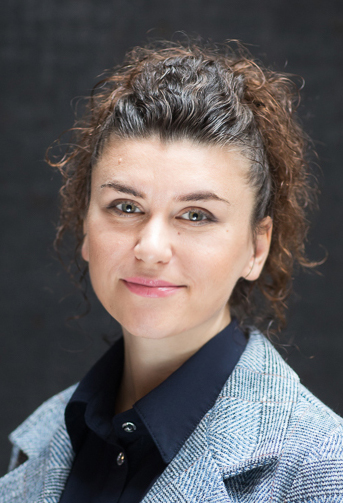 Sexual violence was one of the most horrific parts of women’s everyday lives during the Holocaust. This research project analyses the causes, patterns, dynamics, and consequences of sexual violence against Jewish women and girls during the Shoah in Ukraine using a gender approach. The main questions under consideration include: Was sexual violence a by-product or rather a tool of genocide? How and why could rape be considered an instrument of terror, humiliation, punishment, revenge, dehumanisation, demonstrating power, bonding among perpetrators, and constructing gender roles? What is sexual about sexual violence in the Holocaust? The project analyses how cultural ideas and discourses about the body, sexuality, reproduction, and ethnic, racial, national, religious, and political identity as well as positions of power contributed to perpetrators’ motivations and strategies for sexual violence, as well as victims’/survivors’ experiences of these processes. The project seeks to create a meaningful space for Jewish women’s voices and perspectives.
Sexual violence was one of the most horrific parts of women’s everyday lives during the Holocaust. This research project analyses the causes, patterns, dynamics, and consequences of sexual violence against Jewish women and girls during the Shoah in Ukraine using a gender approach. The main questions under consideration include: Was sexual violence a by-product or rather a tool of genocide? How and why could rape be considered an instrument of terror, humiliation, punishment, revenge, dehumanisation, demonstrating power, bonding among perpetrators, and constructing gender roles? What is sexual about sexual violence in the Holocaust? The project analyses how cultural ideas and discourses about the body, sexuality, reproduction, and ethnic, racial, national, religious, and political identity as well as positions of power contributed to perpetrators’ motivations and strategies for sexual violence, as well as victims’/survivors’ experiences of these processes. The project seeks to create a meaningful space for Jewish women’s voices and perspectives.
Marta Havryshko is a Research Associate at the I. Krypiakevych Institute of Ukrainian Studies at the National Academy of Sciences of Ukraine. Her research interests include sexual violence during the Holocaust and the Second World War, gender history, and nationalism. In 2019/20, she was a fellow at the United States Holocaust Memorial Museum. Her research has been supported by Yad Vashem, the German Academic Exchange Service, Yahad-In Unum, Monash University, and others.
E-Mail: This email address is being protected from spambots. You need JavaScript enabled to view it.
Emily Gioielli
Research Fellow (01/2022-08/2022)
Cataclysm: Water and the Holocaust in Central Europe, 1933–1945
 “Cataclysm” is a socio-environmental history of the Holocaust in (East) Central Europe. Using water as the connecting thread, this study investigates how hybrid human-ecological processes shaped the practices, experiences, spaces and memories of violence and persecution of European Jews, and how, in turn mass death and persecution shaped the natural world. Using methods and questions from both environmental and social history, “Cataclysm” investigates four themes that were defined by the cooperation and sometimes tension between human initiative and natural processes in Central Europe: the construction of genocidal spaces and “pariah landscapes”; forced and slave labor operations in camps and ghettos; mass killing operations; and resistance and adaptation to the environments of destruction produced by the National Socialist regime and their allies across central, eastern, and southeastern Europe.
“Cataclysm” is a socio-environmental history of the Holocaust in (East) Central Europe. Using water as the connecting thread, this study investigates how hybrid human-ecological processes shaped the practices, experiences, spaces and memories of violence and persecution of European Jews, and how, in turn mass death and persecution shaped the natural world. Using methods and questions from both environmental and social history, “Cataclysm” investigates four themes that were defined by the cooperation and sometimes tension between human initiative and natural processes in Central Europe: the construction of genocidal spaces and “pariah landscapes”; forced and slave labor operations in camps and ghettos; mass killing operations; and resistance and adaptation to the environments of destruction produced by the National Socialist regime and their allies across central, eastern, and southeastern Europe.
Emily Gioielli is an Assistant Teaching Professor of History in the Humanities and Arts Department at Worcester Polytechnic Institute starting in August 2021. Her research focuses on the history of violence and regime change from a transdisciplinary perspective and the history of women, gender, and sexuality in twentieth-century East Central Europe. She holds a PhD from Central European University (Budapest), and her research has been supported by Imre Kertész Kolleg Jena, the American Council of Learned Societies (ACLS), the Rockefeller Archive Center, and the Open Society Archives in Budapest.
E-Mail: This email address is being protected from spambots. You need JavaScript enabled to view it.
Kamil Kijek
Gerda Henkel –Research Fellow (03/2022-08/2022)
The Last Polish Shtetl? Jewish Community of Dzierżoniów, Jewish World, the Cold War and Communism (1945-1950)
 Main goal of my research is to confront some of the central problems of post-1945 Polish Jewish, general Jewish, Polish and Cold War history from a micro-historical angle of one, small-town Jewish community. The Jewish community of Dzierżoniów provides a unique perspective in this regard, given that in July 1946 its members made up almost 50% of the inhabitants of the town, thus making the town unique on the map of post-Holocaust Europe. Through this micro-historical perspective of Dzierżoniów I am researching problems such as: Jewish transnationalism on both sides of the “Iron Courtain”, Zionism, Communism and rivalry between them, antisemitism and Polish-Jewish relations, the Jewish role and Jewish context of Polish takeover of a former German territory, where Dzierżoniów (Reichenbach) was located.
Main goal of my research is to confront some of the central problems of post-1945 Polish Jewish, general Jewish, Polish and Cold War history from a micro-historical angle of one, small-town Jewish community. The Jewish community of Dzierżoniów provides a unique perspective in this regard, given that in July 1946 its members made up almost 50% of the inhabitants of the town, thus making the town unique on the map of post-Holocaust Europe. Through this micro-historical perspective of Dzierżoniów I am researching problems such as: Jewish transnationalism on both sides of the “Iron Courtain”, Zionism, Communism and rivalry between them, antisemitism and Polish-Jewish relations, the Jewish role and Jewish context of Polish takeover of a former German territory, where Dzierżoniów (Reichenbach) was located.
Kamil Kijek is Assistant Professor in the Jewish Studies Department at the University of Wrocław. He held various fellowships in the United States, Israel, Germany and the United Kingdom. His research interest are Central-East European Jewish History at the end of the 19. and 20. century, social and cultural theory. In 2018, he has received an international prize for his publication titled Jews and Illiberal Regimes in Eastern Europe after 1917 granted by the Leonid Nevzlin Research Center for Russian and East-European Jewry at the Hebrew University of Jerusalem.
E-Mail: This email address is being protected from spambots. You need JavaScript enabled to view it.






